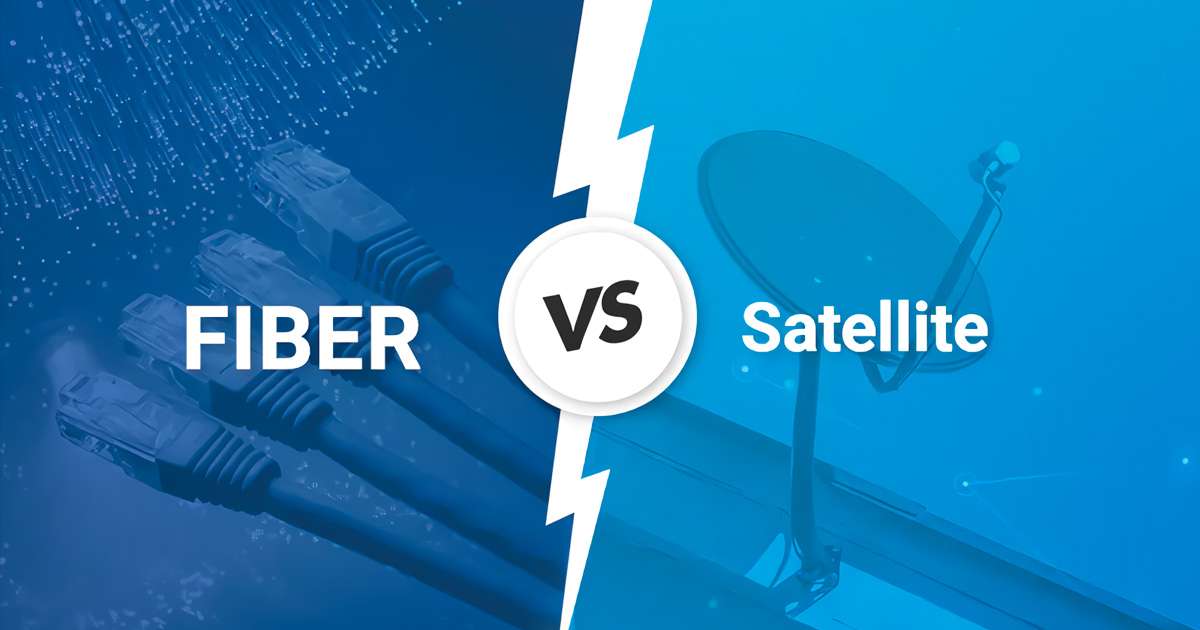Fiber vs. Satellite Internet – Making the Choice for High-Speed Connectivity

Having access to reliable internet connectivity is more important in today’s world. The debate over fiber vs. satellite internet has raged for years, each with unique advantages and disadvantages. In this comprehensive exploration, we will delve into the differences between fiber and satellite internet, examine their strengths and weaknesses, and ultimately determine which emerges as the victor in the contest of internet connectivity.
What is fiber?
Before we delve into the fiber vs. satellite internet comparison guide, let us briefly overview the two. In the realm of technology, fiber typically refers to “fiber optic” or “fiber optic cables.” These cables are at the forefront of high-speed data transmission. Fiber-optic cables, as opposed to copper cables, use light pulses sent through extremely thin strands of glass or plastic. This technology has revolutionized how information is transmitted over vast distances, offering numerous advantages. Fiber optic cables allow for extremely rapid data transmission, typically in the gigabits or terabits per second range. They are the standard for telecommunications and high-speed networks.
One of the key attributes of fiber optics is their low latency, which means minimal delay in data transmission. As a result, they excel in online games, video conferences, and monetary transactions that require instantaneous responses. Fiber optic cables are highly reliable, less susceptible to interference, and capable of carrying vast amounts of data simultaneously, thanks to their high bandwidth. These qualities have made fiber optics an integral part of modern communication networks, supporting everything from internet access to international data transmission.
What is satellite Internet?
To better understand the fiber vs. satellite internet battle, you must also know what satellite internet is. Communication satellites in Earth’s orbit provide connectivity for satellite internet users. Users have a satellite dish installed at their location, communicating with these satellites. With this innovation, satellite internet may be brought to rural and outlying locations that lack access to other types of high-speed internet, such as fiber or cable. It offers broad coverage and two-way communication capabilities, enabling users to download and upload data.
However, satellite internet has some limitations. It generally has higher latency due to the data traveling to space and back, which can impact real-time applications. Many satellite internet plans come with data caps, and while they provide reliable connectivity, weather conditions like heavy rain or thick cloud cover can affect signal quality. Despite these limitations, satellite internet serves as a crucial lifeline for those in areas with limited internet access options, offering a means to stay connected in remote regions.
Fiber vs. Satellite Internet: A Thorough Comparison
Internet connectivity is vital for various activities, from work to entertainment and education. Two major players in the internet service market are satellite internet and fiber optics. To make an informed decision, let’s evaluate each of their merits and drawbacks.
Speed
Is satellite internet faster than fiber optic? Speed is the most important thing to consider regarding internet service. Fiber optic internet is known for moving at speeds as fast as lightning. Light pulses send information through thin bands of glass or plastic. With this technology, speeds of up to 1,000 Mbps (megabits per second) or faster are possible. Fiber is great for activities that use a lot of bandwidth, like streaming, online games, and video conferencing, because it has low latency and high bandwidth.
On the other hand, satellite internet sends signals from satellites that circle the Earth. While satellite internet has made significant strides in terms of speed, it typically offers speeds ranging from 25 to 100 Mbps. However, one notable drawback is latency. The signal must travel an extensive distance to and from space, resulting in a noticeable lag during online activities. So, despite improvements, satellite internet still needs to catch up to fiber optics in terms of pure speed.
Reliability and Consistency
Reliability and consistency are essential aspects of any internet service. Fiber-optic internet enjoys an excellent reputation for reliability. Since its infrastructure is buried underground, it is less susceptible to weather-related disruptions or physical damage. This ensures the internet link stays stable, even in bad weather.
In contrast, satellite internet can be more vulnerable to weather interference, such as heavy rain, snow, or thick cloud cover, which can disrupt the signal. This means that satellite internet users may experience slowdowns or even complete loss of service during inclement weather. Therefore, fiber-optic internet has a clear advantage regarding reliability and consistency.
Coverage and Accessibility
In the battle of satellite internet vs. fiber optics, one area where satellite internet shines is coverage and accessibility. Fiber optic networks are primarily concentrated in densely populated urban areas, making them scarce or non-existent in rural or remote regions. On the other hand, satellite internet can reach almost any place with a good view of the sky. This makes satellite internet a lifeline for places that are far away and don’t have other high-speed choices.
Installation and Setup
Installing internet service can also be a critical factor in decision-making. Fiber optic internet installation involves the intricate process of underground cables, which can be time-consuming and costly. This may require digging up roads and sidewalks in urban areas, making it a complex and potentially disruptive endeavor.
On the other hand, it is easy to set up satellite internet. Users receive a satellite dish that connects to a modem, allowing for quick installation in a matter of hours. This simplicity makes it an attractive option for those seeking immediate internet access, especially in areas without fiber-optic infrastructure.
Cost
One major perspective you need to consider in the battle of satellite vs. fiber optics is their cost. It is a significant consideration for many when choosing an internet service. Fiber-optic internet typically comes with a higher initial installation cost. The infrastructure required for fiber optic networks, including the installation of cables and equipment, can drive up the upfront expenses. However, the long-term benefits in terms of faster speeds and reliability may offset the higher initial investment for those who prioritize these factors.
While generally more affordable for installation, satellite internet may come with data caps and higher monthly fees. Users who require unlimited data for activities like heavy streaming or online gaming may find satellite plans less cost-effective in the long run.
Satellite Internet vs. Fiber Optic: The Verdict
There is no one-size-fits-all answer in the battle of fiber vs. satellite internet. Which one you choose will depend on your wants and situation. Fiber-optic internet excels in speed, reliability, and low latency, making it the preferred choice for urban dwellers with demanding online activities.
On the other hand, satellite internet’s wide coverage and accessibility make it a crucial lifeline for those living in remote or underserved areas. Its straightforward installation process also appeals to users seeking immediate internet access without the need for complex infrastructure development.
Choosing between satellite internet and fiber depends on your needs, location, and priorities. Both have their strengths and flaws, so it’s important to understand these differences before deciding. Fiber-optic internet is the best choice for many because it is the fastest and most reliable. However, satellite internet remains indispensable for those with limited connectivity options. By considering factors such as speed, reliability, coverage, installation, and cost, you can select the internet service that best suits your requirements and ensures you stay reliably connected in the digital age.

